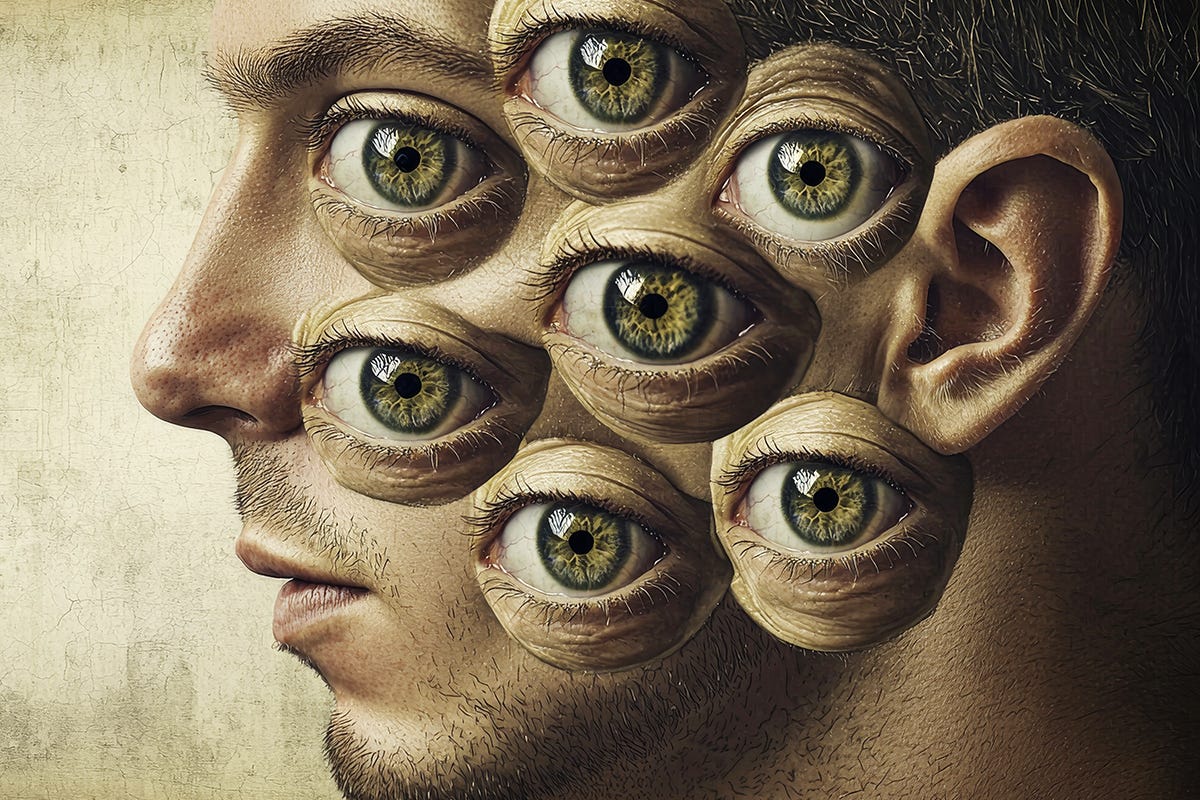Dominant or Dictator? Narcissistic Abuse in D/s
Spotting The Signs Of Emotional Control Disguised As Dominance
“This post discusses narcissistic abuse in the context of kink/ D/s dynamics. Read with care.”
There’s a line, sometimes razor-thin, between a dominant who leads with care and one who controls with cruelty.
In the world of Domination & submission, or D/s, where trust and power intersect, it’s easy to confuse intensity with integrity. But when dominance becomes a mask for manipulation, we’re no longer talking about kink, we’re talking about narcissism.
Narcissistic abuse can occur in any relationship dynamic. D/s isn’t the problem, but it can be a convenient cover. Healthy kink is rooted in care, clarity, and mutual empowerment.
Of course, not all Dominants are narcissists by any means, but when a narcissist takes that role, the results can be uniquely damaging.
So let’s talk about the red flags, the gut feelings, and the quiet unravelling that happens when the dynamic turns toxic...
When Power Meets Pain:
“Where Domination and Submission Should Come From, and Where They Often Do”
Domination and submission, in their purest forms, are rarer than we’d like to admit. True dominance isn’t about ego, but too often, it gets tangled up with it: the need to be seen, to feel powerful, to matter. Sometimes it stems from deep insecurity, self-loathing, or plain old misogyny or misandry.
And submission? It’s just as easily misunderstood. Some submit from a place of self-worth, others from self-erasure. Low self-esteem, unhealed trauma, a desire to be punished not as play, but as penance. It’s not always conscious, but it’s real.
There is healthy D/s, and there is harmful D/s.
Most of us carry baggage, shadow parts, unmet needs and painful histories. Some among us do the work. But others? They slip in through the cracks, leading with charm and fantasy. The perfect Dom: intense, attentive, everything you thought you’d never find. The charmer who spins you a story and sells you a dream. You feel chosen. Seen. Special.
And then, slowly, the mask slips.
Maybe it’s you? You’re too sensitive? Too dramatic?
So you let it slide… just this once.
Red Flags in Leather Gloves: The Telltale Signs of a Narcissistic Dom
This wasn’t my own dynamic, but I was pulled into the aftermath, an unwilling witness to someone else’s unravelling. What followed became an uninvited case study in Grandiose Narcissism, played out like theatre, with real emotional casualties.
Here was a man I genuinely admired. A friend, I thought, maybe even for life. Charismatic to the core. He could warm a room in seconds, reading people effortlessly and saying exactly the “right” thing. He had the gift of small talk, the kind most dread or fumble through. But he made it look like art, like connection. He said the things you wish you’d said. Did what others wished they could do.
He wasn’t conventionally attractive, but that made no difference. Women were drawn to him, they handed over loyalty and affection as if enchanted. Drinks were bought for him by strangers. Staff doted on him. It was something beyond flirtation, it was social hypnosis.
Naturally, I was intrigued. Who was this extraordinary man? This leader? This so-called “natural Dom”?
Then, after a few months, the mask slipped. Fast.
All that attention, that validation, the “care”, it wasn’t care at all. It was love bombing, even in friendship. And when it stopped, the devaluation began, so quickly and subtly that even a comment about a preferred grocery store could become a battlefield. Suddenly, you are always "wrong.”
Then came the gaslighting.
Gaslighting, Losing Your Inner Compass
Gaslighting is a psychological tactic, a form of manipulation that robs you of your own rational thought. It sows doubt. And with doubt comes dependency on the very person who’s distorting your reality.
It’s not about adding tension (as the word might misleadingly suggest), and it has nothing to do with fire or ignition. The term comes from the 1944 film Gaslight, in which a husband dims the lights in their home and convinces his wife she’s imagining it. But the metaphor barely scratches the surface.
Being gaslit, truly gaslit, is slow, insidious, and deeply damaging. In my experience, the gaslighter often knows exactly what they're doing. It's emotional abuse masked as guidance, care or concern. When the person doing it is a dominant partner, the damage goes deeper, because it’s happening under the guise of “trust,” a “dynamic,” or “training.”
Over time, it erodes your ability to trust yourself. You become dependent on their approval, their interpretation of events, their version of who you are, because you’re now “too sensitive,” “too irrational,” “too needy,” or just too plain “useless” to rely on your own instincts. According to them, you’re always wrong.
Your judgment no longer holds weight. You’re slowly reduced and humiliated into believing your thoughts, feelings, and decisions are invalid. You begin to second-guess everything. Even your own reality feels uncertain.
It’s a slow, insidious form of personal erasure.
And that’s the point.
This man’s domination wasn’t rooted in strength, but in deep insecurity and self-loathing. He would gaslight and devalue his submissives, always waiting until they were fully invested. Once they were in, the gifts would stop, the kindness would fade, and what followed was a slow erasure disguised as intimacy and care. It wasn’t dominance. It was control, pure and calculated.
Terrified of being seen for what he believed he truly was, he used others to hold up his collapsing sense of self. He would put them down, manipulate them, and most of all, control every detail of their lives. Nothing could be left to chance. His submissives weren’t partners, they were scaffolding, holding up the shaky structure of his identity.
This man, a grown intelligent individual, was fully aware of the emotional abuse he inflicts, destroying lives in the most insidious way; by extinguishing another person’s flame to serve his own.
The Narcissist’s Spotlight
“When It’s Always About Him”
The Grandiose Narcissist is usually always the victim. And everything, and I do mean everything, is about him. If the conversation drifts away from him for even a second, his eyes glaze over, ears shut off, and he’s suddenly somewhere else. Sometimes literally: turning mid-sentence to strike up a new conversation with someone else, leaving you talking to air. Because really, who cares about your story anyway?
This is someone with zero interest in helping others unless it serves a direct benefit to him. There’s no quiet altruism here, no modest generosity. In truth, there wasn’t much of anything under the surface. He borrowed charm like a costume. He stole stories, jokes, opinions, entire vignettes lifted from other people’s lives. What I’d once found insightful or original turned out to be a recycled script, rehearsed and ready, like wheeling out Grandma’s old hostess trolley at Christmas.
The Grandiose Narcissist isn’t just shallow, he’s bored. Deeply, chronically bored. So much so that he creates chaos just to feel alive. Without attention or validation, he begins to unravel. He can’t sit in silence. He can’t be alone. He can’t face his own thoughts.
So he feeds on yours. Your emotions, your energy, your light, all become toys for him to manipulate and destroy, just to feel something and prevent himself from looking inwards. He provokes like a cat with a mouse, testing, prodding, watching to see where he can inflict the deepest wound. Not physically, of course, he’s the “good guy,” he’d never do that. No, he’ll just dismantle your entire sense of self instead.
Another thing I noticed was an inability to engage in meaningful one-on-one conversations. I’m not sure if this was unique to my experience, but I found myself driving the entire interaction, carrying the narrative, filling every silence. It was exhausting. He had so little to say in private, and yet paradoxically, so much to say in public. Still, he seemed to crave those private moments.
What stood out even more was how this shifted in public. The grandiose narcissist came alive when there were others around: the next table, the bar staff, passing women, especially attractive ones. He’d hold doors open theatrically, perform for waiters, posture at passersby. Whilst one-on-one (unless in the love-bombing stage), he was flat. But give him an audience, a waiter, a passing woman, anyone, and he lit up like a puppeteer’s muppet: lifeless until someone metaphorically shoved a hand up his backside. For those who remember, it was less man, and more Rod and Emu, lifeless until there was someone to perform for.
“Emu, forgive me. I don’t mean to tarnish your reputation. You were one of my favourites, and quite frankly, you probably would’ve made an outstanding Dom.”
This particular GN was especially fond of busy cocktail bars, noisy, packed places where meaningful conversation is nearly impossible. He seemed perfectly content sitting there, combing his hair, scanning the room like a preening peacock. I, meanwhile, sat bored and ignored, like I was there to witness his reflection rather than share a connection. Maybe that’s the point, when you're in love with your own image, you don’t need conversation. You need a mirror.
He struck me as emotionally stuck in early adolescence, trapped in that phase where a teenager’s primary concern is how they appear to others. He hadn’t yet matured into a worldview where not everything revolves around him. As a teenager, maybe I would have loved sitting in that noisy cocktail bar too, observing and being observed. But now? I just wanted connection, whereas he didn’t want intimacy; he wanted reflection.
When Care Is Control
He didn’t just isolate his wife, he dismantled her life piece by piece. Under the careful narrative that she was simply “antisocial,” he severed every connection she had under the guise of care. But that wasn’t the truth. Her isolation was the product of years of quiet, calculated psychological conditioning.
He wouldn’t let her speak to another human being unless he was there, supervising, not out of jealousy, but out of “care” for her supposed social anxiety. An anxiety, notably, that never seemed to appear unless he was around.
The real fear? That she might connect with someone. That someone might hold up a mirror and reflect back the reality she was living in, a controlled, diminished version of herself.
And here’s the thing: he knows. On some level, he knows exactly what he’s doing. He knows he can’t get caught, which means he also knows he’s in the wrong. Which means he knows he’s an asshole.
She became a ghost in her own home, pushed to the edges of existence while he brought submissives in and out like guests at a hotel. And don’t be fooled, he was secretly destroying them, too.
A Ghost in The Machine
He turned his submissive wife into a ghost, not just metaphorically, but in every lived, lonely sense. She drifted through the house like background noise, barely visible, her presence reduced to silence and permission. Once a vibrant, independent woman, now she lived only in the edges, made small by years of isolation, told she was antisocial, kept from friends, never allowed even a chat without surveillance. It was coercive control masked as dominance and care, as she had faded right before our eyes.
Wounds That Don’t Bruise: The Quiet Violence of Emotional Abuse
In some ways, what I witnessed was more chilling than dealing with a brute. You can almost forgive brute force, not morally, but in the sense that you understand it. It's unrefined, impulsive, reactive. But this man? His abuse was calculated. Masked as kindness. Cloaked in charisma. And that seemed to make it so much worse.
Years ago, when I was very young, I was in a physically violent relationship. I remember the terror of hearing the key in the door, not knowing whether he’d be in a good mood or a dangerous one. But the truth is: bruises eventually heal.
While I absolutely don’t condone physical violence, which is always unacceptable, what he did felt even more corrosive. More insidious. This was emotional torture delivered by someone who knew exactly what he was doing, not a man who couldn’t control his rage, but one who consciously manipulated with surgical precision. It was psychological warfare, not an impulsive outburst.
And here’s the real cruelty: victims of this kind of abuse rarely get sympathy. There are no bruises. No visible wounds. Nothing to hold up as proof. Yet lives are destroyed. Selves are dismantled. And it all comes from one man’s deep hatred for himself, masquerading as dominance and superiority.
The Masks of Love
And the worst of it? It’s all dressed up as care. As wit. As love.
I remember overhearing something he said to his wife, one of many casual, cruel digs. He laughed and told her,
“Only you could mess up something that simple… That’s why I love you.”
On the surface, it sounds harmless, even teasing. A private joke. A shared absurdity between a couple.
But when you’ve seen the full picture, you know: it wasn’t a joke. It was another needle. Another moment of quiet humiliation. A reminder of how little he respected her, dressed in warmth and wrapped in a smile.
Comments like that came constantly, mocking her intelligence, her instincts, her confidence, all under the guise of “playfulness”, “banter” or “care”. But it wasn’t banter. It was erosion. And she was disappearing by degrees.
Invisible Chains
While she was disappearing, her isolation and dependence on him only deepened, reinforcing his image of himself as an untouchable, caring, masterful dominant. As a submissive, she complied, escalating her obedience even as his cruelty increased. The sad truth is, I think he needed her far more than she ever needed him, but she was so psychologically entrenched, it felt impossible to reach her. Stockholm Syndrome? Maybe. Whatever it was, it had its claws in.
And what can you really do, in mature adult relationships, when everything on the surface appears fine? When the bruises are invisible, and the prison is built from love and loyalty? When she openly declares love for the very person who’s erasing her?
The Many Faces of Narcissism: Covert vs. Grandiose
Narcissism isn’t just one expression. The grandiose narcissist is loud, charismatic, and obvious, the centre of attention, craving admiration, often aggressive in their need for control. They’re the “classic” narcissist most people imagine. But there’s another type: the covert narcissist, quiet, subtle, and manipulative beneath a veneer of humility or victimhood. These narcissists are experts at playing the martyr or the misunderstood, luring their submissives with seemingly gentle care, only to trap them in emotional webs. Both forms can be devastating in D/s relationships, but their tactics differ in style and impact.
I had the misfortune of dating a covert narcissist for a few years, despite the promise, it turned out to be the most empty and ultimately unrewarding D/s experience I’ve ever had. In some ways, I’m still recovering.
As a submissive, you can find yourself giving and giving, holding on to potential and the words they spin, just enough to keep you there, but never enough to feel safe. He sold me a dream, only to run at the first sign of reality.
He craved escapism, the gloss, the surface-level power and control. But the moment things got real, when vulnerability, reflection, or genuine emotional presence were required, he disappeared. Off chasing the next novelty, the next ego boost.
Unable or unwilling to look within, he rewrote the narrative, evaded accountability, and left someone else to carry the shame.
Covert narcissists are often harder to spot than the overt kind. I was drawn in for years before the cracks began to show, promises fell apart, and the lies started stacking up. Despite leading teams, managing millions, and being featured in finance magazines, he was emotionally stunted. Beyond money, power, and sex, there wasn’t much beneath the surface. Connection and intimacy felt like a waste of time to him, distractions from work, rather than something meaningful to build.
Again, the covert narcissist was so fascinated with himself, there was little room for anyone else. D/s, for him, was a solo journey, which left me largely superfluous. Often, I wondered why he didn’t just date a pair of suspenders and cut out the middleman. But I fell for the charm, the power, the lies, and the victim-blaming. I held onto the potential, even though I’d effectively spent three years training someone from the ground up, without ever getting real satisfaction. Still, I was prepared to make the sacrifice. I also had to accept my part in it; I allowed it, and that was my responsibility. But it’s hard to make the right choices when you’re operating under half-truths, distortions, and lies.
Here was a man who confused dominance with a need to feel powerful and important. Obsessed with money, control, and status. If I’d been a walking investment portfolio, he’d have proposed.
And why? Because he was poor in spirit, equating wealth with worth. Another man terrified of being alone with his thoughts, needing submissives, status, and success to feel powerful, because deep down, he didn’t.
And that’s the tragedy: he already was enough, without any of the things he chased. He just couldn’t bear to look within to reclaim the power he already had.
A Dominant doesn’t need to be made to feel powerful; he already does. This is where both covert and grandiose narcissists can become dangerous.
Why We Stay
Looking back, I should have left some relationships far earlier. But when you’re in it, things aren’t so clear. Narcissistic partners are masters of emotional confusion, giving just enough to keep you hooked, never enough to feel at peace. You end up chasing the high of who they were in the beginning, not realising that version never truly existed.
Staying often feels easier than facing the wreckage. There are financial ties, shared memories, and social appearances to maintain. And narcissists exploit that. They create dependency, emotional, practical, even sexual, until your world shrinks around them. You stop trusting your gut. You start managing their moods instead of your needs.
And in D/s relationships, that intensity is amplified. You’ve shared parts of yourself rarely seen. That makes the betrayal deeper. Narcissists use the language of dominance to manipulate, not to connect. They offer structure but deliver instability. They demand surrender without responsibility. And when the mask slips, you may tell yourself it’s just a phase, or your fault, anything but the truth: they were never the person they pretended to be.
We stay because we remember the beginning. Because we’ve given so much. Because the alternative, starting over, being alone, is terrifying. But slowly, staying starts to cost more than leaving ever would.
Breaking Free
The difference between a Dominant and a dictator is care, and care without respect isn’t care at all, it’s control. Narcissistic Doms don’t lead, they erode. They take power without earning trust, rewrite reality in their favour, and leave submissives questioning their worth, their memories, even their minds. But submission isn’t weakness, and obedience isn’t consent when it’s extracted through fear, confusion, or slow psychological decay.
Breaking free from this kind of dynamic isn’t just brave, it’s necessary. Because no kink, no connection, no collar is worth the loss of your selfhood. You don’t owe your devotion to someone who uses dominance to disguise damage. You deserve D/s that empowers, not diminishes. That builds, not breaks. That sees you, not erases you.
A final note from Miss O
I understand I might sound blunt when I talk about narcissists, but after experiencing and witnessing the psychological damage they can inflict, it’s hard not to be.
The word ‘narcissist’ gets thrown around a lot; it’s almost become a catch-all insult. But a true narcissist isn’t just someone who’s vain, self-absorbed, or more in love with their reflection than with you. That misconception comes from the myth of Narcissus. In reality, it’s far more complex and far more damaging.
True narcissists aren’t obsessed with mirrors; in fact, it’s almost the opposite. If they were to truly look at themselves, they might have to confront the shame and self-loathing that lives beneath the surface. And that, they can’t bear. So instead, they control others. They feed off your emotions, your energy, your identity, not out of strength, but to avoid facing their own emptiness.
Of course, I’m not a therapist. I’m speaking from personal experience, not professional expertise. Everyone has issues, and everyone deserves compassion and access to support. No one is born this way. But when harm is repeated, deliberate, and done with full awareness, when someone erodes another person’s sense of reality or self just to feel powerful, we have to call it what it is.
Once you’ve encountered a real narcissist, whether in a friendship, family, work, or romantic setting, you’ll know. It’s disorienting. It’s often slow and subtle at first. But when the mask finally slips, the impact is undeniable. And so is the cost.
Seeking Support
If you're feeling stuck, unsure, or want to explore these dynamics with someone who understands kink, D/s, and non-traditional relationships, consider reaching out to a kink-aware therapist. Pink Therapy is a great place to start. They offer a directory of professionals who won’t pathologise your identity or desires, but can help you process, recover, and rebuild on your own terms.
You can also use broader therapy directories by searching terms like kink-friendly, kink-aware, sex-positive, or BDSM-friendly to find someone aligned with your needs.
Alternatively, there are some valuable resources on YouTube, with entire channels dedicated to dealing with narcissistic abuse, often hosted by qualified therapists who specialise in narcissism and recovery. It’s well worth exploring. The right knowledge at the right time can change everything.


















